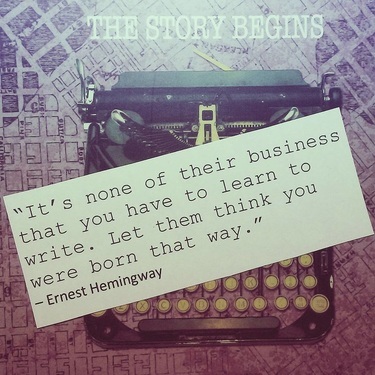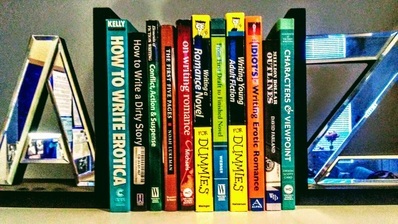How To Be A Writer
 To be a writer, you have to learn how to write. I’m not saying you have to go out and get an MFA – although that is a wonderful thing to have. But if you want to write stories for other eyes to read and enjoy, you must learn the craft of writing. Now, I’m not an expert. But I have learned a few things that I’m happy to share with you. So, here’s my top ten list of things you can do to become a writer.
To be a writer, you have to learn how to write. I’m not saying you have to go out and get an MFA – although that is a wonderful thing to have. But if you want to write stories for other eyes to read and enjoy, you must learn the craft of writing. Now, I’m not an expert. But I have learned a few things that I’m happy to share with you. So, here’s my top ten list of things you can do to become a writer.1) Read. Read everything. Read both in your genre and outside of it. Above all, this will help you to internalize the methods of telling a story. Reading in your genre will help you to understand the expectations of that genre and to discover what you do and do not like. It will not mean that you copy other writers’ work. Your first attempts might be heavily influenced, but as you learn and grow, you’ll develop your own voice.
Reading outside your genre is important as well. Think of the athlete who does cross training to improve their overall fitness. The same is true for writers. Cross train in your reading so you can build up your writing muscles. For example, if you write science fiction, reading romance can help you understand how to develop a love story arc for your characters.
2) Read. Read craft books. Many people are natural storytellers. But if you want to go to the next level and are considering writing for publication, you’ll need to learn the mechanics of telling a story. You’ll learn pacing so you don’t bog down your first pages with a giant information dump, have a soggy meandering middle and then a hectic end. You’ll learn how to create characters as people, rather than cardboard cut outs of people. You’ll learn conflict and setting and so much more.
 Some of my favorite Writing How-To books. 3) Pay attention to various forms of storytelling. When you’re watching a movie, take note of the little things. Did they make a point of showing a character’s red sweater tossed in the back seat of a car? If so, that sweater might mean something later on. This is foreshadowing and is a great device to use in writing. You should also go and see a play. It’s one of the best ways to see the three-act structure of storytelling (set up, confrontation, resolution) in action.
Some of my favorite Writing How-To books. 3) Pay attention to various forms of storytelling. When you’re watching a movie, take note of the little things. Did they make a point of showing a character’s red sweater tossed in the back seat of a car? If so, that sweater might mean something later on. This is foreshadowing and is a great device to use in writing. You should also go and see a play. It’s one of the best ways to see the three-act structure of storytelling (set up, confrontation, resolution) in action.4) Pay attention to the world around you. This is a great way to come up with story ideas, settings and characters. For example, you don’t want all your characters to sound the same on the page, so listen to the way people talk. You’ll develop an ear for different rhythms and vocabularies and can use that to give your characters a unique voice. 5) Write. A lot. Unless you’re S.E. Hinton, you’re probably not going to sit down and write a best-seller with your first offering. You’ll need to write a lot of stories to find your author voice and style and learn what works and what doesn’t. Rhonda Rousey, Viola Davis and Joss Whedon had to practice to become some of the best in their fields, and so will you. Each story you complete is another step to becoming the best writer you can be.
 Just like Rhonda Rousey, writers need to practice. 6) Finish what you start. This is a tough one! It’s common for a writer to start a story with lots of enthusiasm and then get bored with it half-way through. Once that happens, it’s easy to be tempted away by the shiny allure of a new plot idea. But don’t do it! You’ll never complete a book if you jump from story to story. To avoid this, have a designated area where you can write down future story ideas so you don’t forget them. Do a quick free write of whatever plot bunnies are bouncing around in your head, then put it away and get back to your Work In Progress. This is important. You must finish a story. Otherwise you’ll end up with multiple half-finished WIPs and you’ll never have anything completed to share with the world.
Just like Rhonda Rousey, writers need to practice. 6) Finish what you start. This is a tough one! It’s common for a writer to start a story with lots of enthusiasm and then get bored with it half-way through. Once that happens, it’s easy to be tempted away by the shiny allure of a new plot idea. But don’t do it! You’ll never complete a book if you jump from story to story. To avoid this, have a designated area where you can write down future story ideas so you don’t forget them. Do a quick free write of whatever plot bunnies are bouncing around in your head, then put it away and get back to your Work In Progress. This is important. You must finish a story. Otherwise you’ll end up with multiple half-finished WIPs and you’ll never have anything completed to share with the world. This is the system I use to help organize and keep track of all the plot ideas in my head. I have notebooks set up where I can write an idea down. Then I use that notebook later when I'm ready to move on to that story and it's all ready to go. They're color coordinated. And glittery. 7) Put your writing out there. Put it on Watt Pad, publish fanfiction on Fan Ficton.net or Archive of our Own, write your book in a series of blog posts on Tumblr or your personal blog, upload it to Goodreads. Do whatever you can to get your writing in front of readers’ eyes. You’ll have fun sharing your stories, gain confidence, build an audience of readers, and get feedback from people besides your mom.
This is the system I use to help organize and keep track of all the plot ideas in my head. I have notebooks set up where I can write an idea down. Then I use that notebook later when I'm ready to move on to that story and it's all ready to go. They're color coordinated. And glittery. 7) Put your writing out there. Put it on Watt Pad, publish fanfiction on Fan Ficton.net or Archive of our Own, write your book in a series of blog posts on Tumblr or your personal blog, upload it to Goodreads. Do whatever you can to get your writing in front of readers’ eyes. You’ll have fun sharing your stories, gain confidence, build an audience of readers, and get feedback from people besides your mom.8) Learn to accept criticism. It’s wonderful hearing someone loves your story. It’s awful hearing someone didn’t like your story. But you have to listen and learn so you can improve from that criticism. It’s the only way you’ll grow as a writer. For example, if someone tells you a plot point doesn’t make sense, don’t just get offended and blow them off. Yes, your feelings will be hurt. But take a look at that plot point and see if there is any merit to what the reader is saying. Maybe something was so clear in your head that you failed to realize it didn’t make it to the page for the reader to see. Or maybe you forgot to establish something early on in the story that would help a future plot point seem plausible to the reader. Basically, keep an open mind for opportunities to improve your craft.
9) Connect with other writers. This is helpful for many reasons. It’ll give you someone to help pep you up during writing slumps. You can make writing dates, whether in real life or online, to do writing sprints. They can serve as critique partners and they can share their knowledge. There are lots of benefits for connecting with other writers, these are just some of the biggies.
You can find other writers by joining writing organizations. I just rejoined Romance Writers of America, as well as a few special interest chapters, and I’m looking forward to interacting with members. You can also follow the #writers, #writing, and #amwriting hashtags on any form of social media and find someone to connect with. And of course, you can chat with me. I think I'm pretty nice.
10) Be sensitive, diverse and fearless. When writing, take one finger off the keyboard and put it on the pulse of society. Keep the world in mind when creating your stories and characters. Your words have meaning and power so use them responsibly. Also, write diverse characters. Write women, men, GLBT, minorities, the disabled. Write everybody! Yes, you might need to do a little research to write someone who is different than you, but that’s okay. Research is fun. And last, be fearless. Tell the stories of your heart and never let fear stop you.
Good luck and happy writing. I'll be back with more posts on the writing process. If you have any questions, let me know in the comments. I'll be happy to answer and it might be something I can add to my lists of topics to cover.
Thanks for reading!
Christa
www.ChristaTomlinson.com
Follow me around the internet! Facebook, Twitter, Instagram, Goodreads
View my titles on Amazon
Published on December 01, 2016 08:30
No comments have been added yet.



